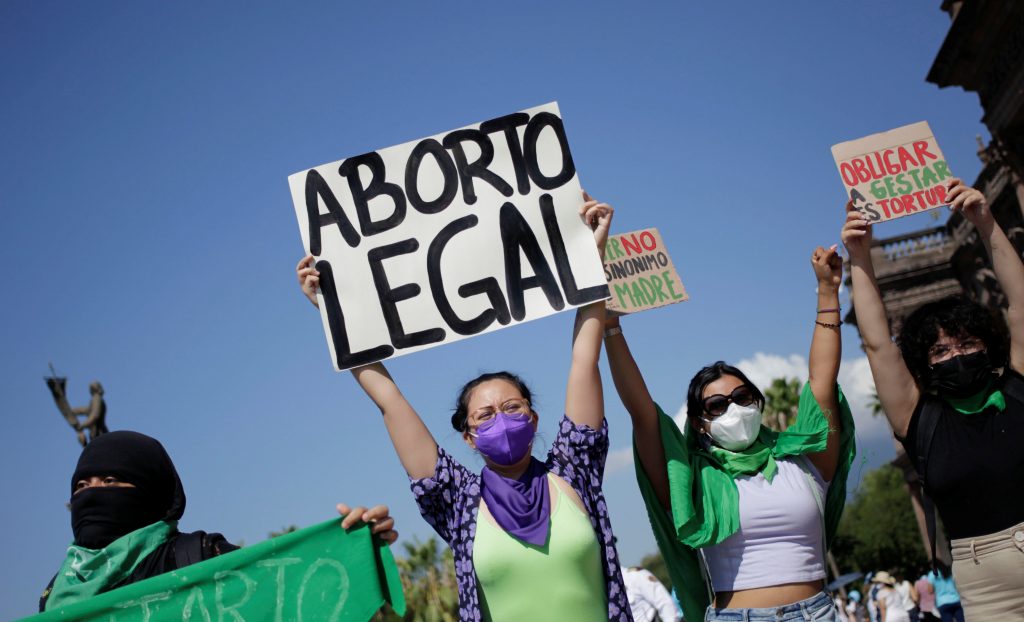Last week, Mexico moved closer to decriminalizing abortion. On September 6, the First Chamber of the Mexican Supreme Court of Justice of the Nation (SCJN) resolved an injunction in favor of the Information Group on Reproductive Choice (GIRE) regarding the unconstitutionality of the articles of the Federal Penal Code (CFP) that criminalized the procedure. It is important to frame this ruling in the context of mobilizations that have taken place at the national level demanding the right to abortion. It comes just a few weeks before planned mobilizations on September 28, the day of struggle for the decriminalization of abortion in Latin America and the Caribbean.
This ruling represents an important advance for the decriminalization of abortion, especially because, unlike previous rulings, this one applies at the federal level. It is the CPF, not a Local Penal Code, making this ruling, as opposed to, for example, the case of Coahuila in 2017 ruling or the most recent one for Aguascalientes. In theory, these rulings have binding principles at the national level due to recent reforms to the judiciary. However, in the strict sense this ruling does not decriminalize abortion in Mexico.
What Does the Decision Say?
The complete decision is based on past rulings of the SCJN, as well as the recommendations of human rights organizations regarding the prohibition of abortion. This includes the UN’s Convention on the Elimination of All Forms of Discrimination Against Women, and its recommendation to decriminalize abortion at the international level. After stating the background of the case, the Court resolved it in two ways. On the one hand, it reiterated the unconstitutionality of the articles of the Federal Penal Code that criminalize abortion, and on the other hand, it ruled in favor of the protection filed by GIRE.
What does this mean? In general terms, on the first point it means the invalidity of Articles 331 and 332 in their entirety, and part of Articles 330, 333 and 334 of the Federal Criminal Code, which speak of the crime of abortion and the corresponding penalties. However, this does not imply that they are automatically removed from the Federal Criminal Code, but rather it is a recommendation of the Supreme Court, and ultimately abortion continues to be criminalized in the CFP. In order for these articles to actually be removed, the Mexican congress would have to discuss and vote on their removal, something that ideally should happen after this ruling. So, no, abortion is not yet decriminalized.
On the second point, the decision implies that abortion cannot be criminalized if and only if the pregnant person is accompanied by GIRE, since it was the Civil Association (AC) that filed the protection. This applies both to those seeking an abortion and to those currently imprisoned for having an abortion. This is clear from these two excerpts:
227. In this sense, the granting of constitutional protection must be understood in light of the legitimate interest recognized to the complainant, which means that the non-application must benefit women and persons who can get pregnant only in those cases in which they are accompanied by the complainant civil association.
230. Therefore, this First Chamber determines that the non-application of the norms that criminalize abortion at the federal level must be carried out by any jurisdictional and administrative authority, specifically, by the personnel of the health institutions involved with the practice of the termination of pregnancy and the agents of the Public Ministry who receive the complaints for these facts, in those cases in which the persons to whom the norms are addressed are accompanied by the complainant association.
And the resolution:
The Justice of the Union protects and protects the Civil Association, through the name of its legal representative, against Articles 330, 331, 332, 333 and 334 of the Federal Criminal Code, for the effects specified in this judgment.
Therefore, this ruling is only applicable to those who are accompanied by GIRE, or who file a similar injunction, which would have to be resolved favorably due to the precedent of this ruling. Although it is a very important precedent for the reasons mentioned above, it is important to note that it still has many limitations. Undoubtedly, this ruling is a result of the struggle in recent years as women and others have taken to the streets to demand the right to abortion, but there is still much to fight for.
Decriminalization vs. Legalization
In addition to the above, it is important to note that there is still a difference between decriminalization and legalization. While decriminalization means removing the crime of abortion from Mexico’s federal penal code and preventing pregnant people from being tried or sentenced for terminating their pregnancies, legalization would mean that abortion is recognized as a right. This means not only decriminalization, but also that the State guarantees the conditions for those who require it to have access to abortions.
For this reason, we have insisted on the need not only to decriminalize but also to legalize abortion. If the right to abortion is not guaranteed free of charge in all clinics and hospitals, access to abortion will continue to be restricted only to those who can afford it. Without free abortion, people who can become pregnant who are workers and from low-income sectors will continue to be denied access to this right.
Legalization should be accompanied by access to information on abortion and comprehensive sex education, leaving behind sex ed that only teaches about reproduction and heteronormative relationships. Legalization must also come with access to free and quality contraceptives, guaranteed by public health institutions, and other basic rights such as extended parental leave regardless of gender, free child care, breastfeeding rooms in schools and workplaces, jobs with a living wage and full labor rights. In other words, we must fight to win the structural conditions that enable parenthood..
Fight for the Right to Legal, Safe and Free Abortion Throughout Mexico
This ruling, while having the limitations mentioned above, must not slow down the green tide that has spread nationwide. Far from lowering our guard, it is time to strengthen our organization and mobilization at the national level to fight for the right to legal, safe, and free abortion throughout the country.
We cannot ignore the fact that this ruling occurred in the context of the beginning of the presidential electoral race, in which two women who are expected to run have tried to claim the feminist label but who have not shown a real willingness to legalize abortion. On the one hand is Xóchitl Gálvez, who would head the right-wing coalition. These right-wing parties have systematically blocked the possibility of legalizing abortion, even with attempts to roll back the decriminalization already won. On the other hand is Claudia Sheinbaum who has alliances with conservative sectors of the religious right. She also helped oversee violent repression including riot police, gas, and beatings of mobilizations of women in Mexico City who were demanding the right to abortion and a stop to violence and femicides.
Just because these presidential candidates are women themselves does not mean that they represent the interests of poor women and women from the working class. They are tied to their political parties which, as we have already seen, are not a true way out of the conditions of violence and lack of rights that affect women. Therefore, it is necessary that we mobilize on September 28 to take to the streets, with the momentum of a women’s movement independent of the government and the right-wing opposition, making it clear that our rights are not electoral political spoils.
It will be with militant struggle and in the streets that we will win our rights, as has been shown historically, as “las pibas” showed in Argentina. Let us mobilize massively this September 28th to demand that ¡que sea ley!: make abortion legal!
First Published in Spanish on September 7 in La Izquierda Diario México.
Translation by Molly Rosenzweig











